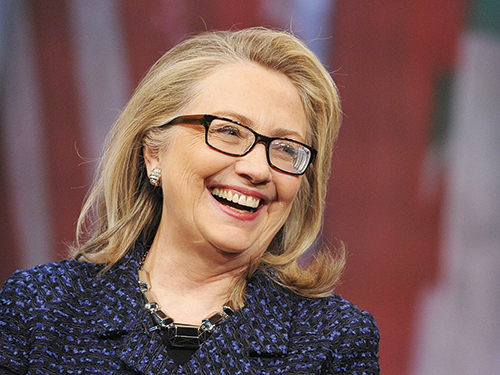On the heels of his second inauguration, President Barack Obama sat down for a 60 Minutes interview with former Secretary of State Hillary Clinton. The two had never conducted a joint interview, which is not to say they’d never been on camera together—who can forget the less-than-cordial Democratic presidential debates of 2007?
Hillary for president: Are we ready?

On the heels of his second inauguration, President Barack Obama sat down for a 60 Minutes interview with former Secretary of State Hillary Clinton. The two had never conducted a joint interview, which is not to say they’d never been on camera together—who can forget the less-than-cordial Democratic presidential debates of 2007?
60 Minutes interviewer Steve Kroft referred to those debates and the evident tension, even hostility, the two exhibited toward each other back then. Both chuckled in an “aw shucks, that was then,” manner and assured the American public that the important thing is that they’re BFFs now.
Aside from achieving the obvious goal—presenting the two as a united front and convincing us that love for our country conquers all past offenses (yeah, right)—some wondered if the interview wasn’t a passing of the baton. It looked an awful lot like an endorsement without actually being an endorsement. And when asked the inevitable questions about her future (which she coyly swatted away like mildly annoying flies), Clinton ruled nothing out.
In four years, will we look back and see this as the first step in her journey to the White House, only this time with a First Husband?
With this comes the all-too-predictable follow-up: Is America ready for its first female president? We hear this constant refrain in news bulletins and political talk shows when people begin to project to 2017, and what’s embarrassing is that it’s treated as a good question.
Obviously, it’s considered a legitimate topic purely because of the fact that we’ve never had a female head of state. We’ve never had to ask if America’s ready for a male president. That’d be a stupid question, right?
Why then do we still have to ask this one? For the same reason male politicians don’t get asked what designer’s clothes they wear, or the reason their looks in general are rarely, if ever, brought up. It’s because when a male politician gets choked up, he’s having a human moment, but when it’s a woman, she’s being emotional. It’s because the term “house-husband” still sounds funny when we say it out loud.
America considers itself a world leader, an example to the nations of the world who want to be just like us. Perhaps we should worry about them a little less. We’re still reeling with pride at the progress we’ve made in electing our first president of color, for goodness’ sake. We might want to pause a minute, take, a quick look around and save the self-congratulatory pats for later; we might see that, for all our love of being No. 1 in the medal count, we’re lagging way behind this time. In fact, we’re nowhere near the podium.
There are currently 17 countries with female presidents or prime ministers. That’s just this year.
Countries like India and Sri Lanka had female leaders in the 1960s, and numerous nations elected female presidents in the 1980s and have ever since. Some of the most notable were Indira Gandhi, Golda Meir and Margaret Thatcher, arguably some of the greatest, most successful and most well-loved prime ministers their countries have ever seen.
We love to hate the supposed “backward” regimes in the greater Middle East and yet, for all our criticism of Islam’s impact on women’s equality, Pakistan gave the world Prime Minister
Benazir Bhutto, one of the most recognized, influential heads of state in her region and beyond. Bhutto did more for her country than most, if not all, of the men who held the same office. In 2008 she was posthumously awarded the United Nations Prize in the Field of Human Rights.
The point: The question of readiness for a female leader is, in many countries, an irrelevant one, and we’re only now just beginning to ask it. What does this say about our progressiveness, the “equality-for-all” crap we like to spout every now and then when we want to feel good?
Perhaps the question we should be asking is, when will we be ready to acknowledge that we live in what bell hooks affectionately calls a “white-supremacist-capitalist-patriarchy”? Until we answer that question, we’ll never be ready.






